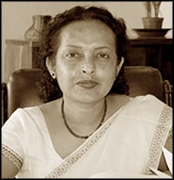|
World Elders Day fell on October 1:
'Let's not worry about ageing'
by Samangie WETTIMUNY
 |
|
Dr.Subhangi Herath |
When dealing with sociological perspectives of ageing it is necessary
to take major definitions into consideration. In fact there are several
definitions on ageing. One is according to the actual age. At a certain
age you are considered as an old person. That definition takes several
factors into account. One is the ability to work. But the ability to
work is not a really objective concept because one's ability to work
varies from person to person very often. But a common age of retirement
is being set and that retirement age slightly changes from one country
to the other. In certain countries it is 55, in some countries it is 60,
or 65 etc. There are countries which even allow older people to work as
long as they are comfortable to work.
As Dr. Subhangi Herath, Senior lecturer of Sociology and former Head
of Department of Sociology of the University of Colombo says the actual
objective definition of ageing should focus on biological ageing. "When
physical ageing process starts, a person becomes unable to perform
activities in the same way that they used to do before."
"But depending on the life expectancy of people in each country, the
actual age of retirement too changes. In the early societies life
expectancy was very low. When the life expectancy is low ageing starts
very early because then people get married and have children very early
in their life and start to grow old very quickly. On the other hand,
when the life expectancy is longer, all the activities become delayed
and their actual retirement age also get delayed and then they start
ageing at a very later age. At the moment people of developed countries
experience a long life expectancy, though Sri Lanka is yet a developing
country we too have reached a life expectancy level which is very close
to that of a developed country.
Gender
But the ageing process seems to differ based on gender. Usually women
live longer than men. "But in early societies men used to live longer
than women. The main reason was the high maternal mortality during child
birth. Anyway there were other causes such as wars, accidents that made
men too to die early."
Today though female life expectancy is higher than that of male in
developed countries, it is not so in developing and under developed
countries Anyway the situation in Sri Lanka is similar to that of
developed countries. Here female life expectancy is high.
The ageing process is decided by life expectancy and the decision
each government has made on the age of retirement. So as you reach the
age of retirement whether you are capable of working in the same manner
or not you will start to feel the ageing process psychologically. But if
you take the present situation into account where people experience high
life expectancy, it is evident that despite unfavourable food patterns
and habits people live longer making full use of advanced medical
facilities.
As Dr. Herath further noted " many people get older without
encountering much trouble." They may suffer from ailments , but it
normally does not make an impact on their active life. "We see that the
majority of people who have reached retirement age have enough capacity
and strength to work further. When you look at the ageing population,
the ratio of older persons is higher today. As child-birth rate is low
in Sri Lanka, the ageing population is comparatively high. By 2015 Sri
Lanka will have 12 percent of population over 55. At the moment about 6
percent of the population are old. In 1911 over 60 population was 3
percent of the population.
Blessing
According to Dr.Herath 'ageing' population should never be taken as a
problem. "People living longer is in fact a blessing to a country." Some
countries tend to consider a large ageing population as a problem as
they are normally supported by a younger population. But on the other
hand as long as the older population is not incapacitated they can be
very productively incorporated in to the production process. "As I
believe if the country is facing an unemployment problem , it should not
be solved by making 'an able' population retire and giving those jobs to
the younger population.
There should be an alternative way to address the problem. There
should be adequate employment opportunities created in the country to
absorb the young unemployed population. But it seems that the young are
of the view that older people should retire and offer those jobs to
them. "But if they are still fit enough to work , I think a feasible
retirement age should be worked out ."
In fact older people are a huge resource base. They have higher
educational qualifications-higher amount of training, and long
experience. Over the years they have gathered a vast amount of
knowledge. Higher amount of training, experiences. So I think those
people are a huge resource base. As long as they are not incapacitated
(they are advanced in age, but still very capable) so those people can
contribute to the economy of the country much longer in various ways.
"So they should not be given a pension, but deserves a salary!
 "Most of the developed countries have extended the retirement age. As
I mentioned before in certain countries you can retire when you feel
that you are not fit enough. Many people work until they are 70. Even in
Sri Lanka, many of the older population are fit enough to work until the
age of 70. So these are the main things we have to rethink about without
adopting the same conservative ideas about ageing process. "Most of the developed countries have extended the retirement age. As
I mentioned before in certain countries you can retire when you feel
that you are not fit enough. Many people work until they are 70. Even in
Sri Lanka, many of the older population are fit enough to work until the
age of 70. So these are the main things we have to rethink about without
adopting the same conservative ideas about ageing process.
Job opportunities
Creating job opportunities to the younger population is a must.
"Creating employment for younger people is a completely different issue.
The ageing population is another issue."
"On the other hand the capable population who are made to retire can
become actually sick by not being able to making contributions to the
country as they used do. We see many people face health problems no
sooner they retire. It affects their mental balance. In many countries
the term senior citizen is being used when referring to the old in order
to give them psychological support.
What is 'actual ageing'
Actual ageing should be physical ageing. Once they feel they are no
longer capable of making the same contribution they should be allowed to
retire and should be taken care of by the working population. Since they
are no longer capable, it is our responsibility to take care of them.
Another major issue is " what happens to you once you actually become
incapable". This is the kind of population that should be considered as
the aged population and we should think of their future. In South Asia
by 2030 Bangladesh will have 9 percent of old population (over 60).
Nepal 7 percent, India 14 percent and Sri Lanka 21 percent.
When people become incapable we have to be worried about them. Who is
going to take care of them - nuclear family or the extended family. On
one hand, younger population is decreasing as the birth rate is very
low. Another striking issue raised by Dr. Herath is whether the younger
generation have adequate income to look after the old. "Even if they
have adequate income how many people can afford to get a care-taker for
older people.?" Can we entirely depend on the care-taker. How can we
ensure that the care-taker will provide the required love and affection
an aged person is in need of. So most of the older people will be very
much isolated in their old age.
Isolation
In Sri Lanka there is a very high rate of migration-both internal and
external. Many young people do migrate seeking better job opportunities
leaving their old parents behind. As a result the ageing population also
suffer from a high degree of isolation. "As long as an old couple live
together they have at least some kind of solace because they have each
other at least. But when a partner dies they will suffer from severe
isolation. Many older women experience this, as men die younger and
women live longer.
So it should be the responsibility of children to look after their
old parents. But we should never overlook the problems of the young. So
in a way there is a huge conflict between the aged and the young.
"Most of the time parents too are normally quite conservative, they
also resist change. And are reluctant to leave their ancestral homes
even though the children are ready to take them. Unlike in many foreign
countries our older people are reluctant to adjust according to the
situation." There are also situations where older females are exploited
by their own children. At a feeble age they have to be the baby-sitters
of their grandchildren.
It is indeed necessary to keep old people occupied, so that they
never get the feeling that they are being neglected. But it is
problematic when there is exploitation of labour.
I would like to note that there is also a huge gender issue about the
matter. Though sometimes there is an exploitation to a certain extent,
on the other hand being a baby-sitter makes them feel active until the
very end of their lives unless they are too much exploited.But what
happens to the older males is quite different. In the Sri Lankan context
, males are usually taken care of by females. So if the wife dies early,
the husband becomes totally isolated. Many of the older males are not
able to actively contribute to the family unless they engage in a job.
They become totally dependant on their children. They have to live a
very difficult life. But in developed countries men are very much used
to take care of themselves, not so much taken care of. "It is quite
necessary to rethink about the ageing process. We have to rethink
whether we want to make an able population retire. It is high time we
changed our attitudes towards it. The way of thinking of the young too
should be changed. There should be a community responsibility. It is not
only of our parents that we have to think about, but of the entire
ageing population.
"We all have benefited from their contributions to society." As Dr.
Herath says larger elder homes where you feel institutionalized should
not be encouraged.
The best thing should be day care centres or rather small houses. We
should make them feel that they have a social life. Once they are in
social centres they can engage in various activities. We the younger
generation should be familiar with the problems and disorders associated
with old age. For example dementia is on the rise in the adult
population.It is necessary to listen to them and share our lives with
them rather than isolating them and labelling them as old.
|

